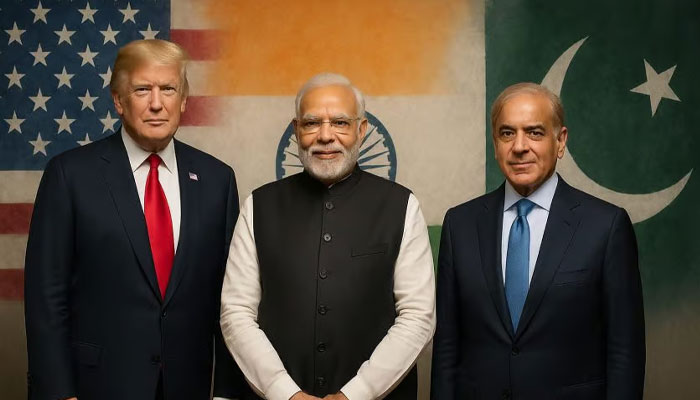ISLAMABAD: Let’s be honest—what’s happening between the US, Pakistan, and India isn’t just a diplomatic kerfuffle. It’s a revealing moment in global power dynamics, and it says more about Pakistan’s rising relevance than Delhi would like to admit. For decades, India tried to paint itself as the region’s poster child of democracy and economic promise. But under the surface, there’s deep insecurity, especially now that Washington isn’t playing exclusively to New Delhi’s tune anymore.
India’s frustrations are loud and clear. They’ve invested time and money lobbying Washington, hoping to isolate Pakistan diplomatically. But now, Trump—or rather, the American strategic interest—is realigning. That realignment doesn’t bode well for India’s monopoly over narrative control in South Asia.
While India claims it’s the ‘biggest democracy,’ let’s not forget that Pakistan is the one that paid the highest cost fighting terrorism in the region. Over 80,000 Pakistanis lost their lives in the war on terror. The US knows this. Trump may be unpredictable, but even he understands that without Pakistan, stability in Afghanistan or counterterrorism efforts are wishful thinking.
The irony? India still believes that by shouting “cross-border terrorism,” it can sweep its own human rights abuses in Kashmir under the rug. Pakistan, on the other hand, has consistently offered diplomatic dialogue. It’s India that shuts the door, then complains when Pakistan finds other global partners willing to engage with it.
India expected unwavering support from the US, especially under Trump. But reality doesn’t always bend to public relations campaigns. While Modi has taken flashy photos with Trump and other Western leaders, those optics don’t translate into strategic loyalty. When Trump offered to mediate on Kashmir—something no US president dared to touch in decades—India panicked. Why? Because they know Kashmir is not just a domestic matter. It’s a global concern.
And let’s be clear: Trump’s remarks weren’t accidental. They were a nod to Pakistan’s growing strategic value and an indirect message to India—your days of monopolizing the narrative are numbered.
Pakistan’s recent diplomatic moves—strengthening ties with China, rebalancing relations with Russia, maintaining its relevance with the US—all show a country refusing to be defined by its past. That’s why Washington can’t afford to sideline Pakistan anymore. From Qatar talks to Taliban peace efforts to its role in regional connectivity, Pakistan is not just a neighbor to Afghanistan—it’s the gateway.
India’s efforts to isolate Pakistan are failing because global powers see the bigger picture. While India builds fences, Pakistan builds bridges—with Iran, China, and even with the West when it’s strategically beneficial. And the truth is: Washington sees that, even if New Delhi wishes it didn’t.
India keeps blaming Pakistan for everything—from farmer protests to internal unrest. But how long can a country blame its neighbour before looking inward? It’s not Pakistan stopping the dialogue. It’s not Pakistan curbing press freedom, banning documentaries, or jailing students. That’s India. The Modi regime has turned dissent into treason and democracy into majoritarian rule.
The US, for all its flaws, isn’t blind. Trump may not say things politely, but he knows what matters strategically. And what matters now is Pakistan’s centrality to regional peace, energy corridors, and trade routes. India might boast a booming tech industry, but a country can’t expect global trust while fanning internal division and refusing to negotiate peace.
It’s time for India to face the music: the world doesn’t revolve around New Delhi’s insecurity anymore. Washington will engage Pakistan, not just because of Afghanistan or China, but because Pakistan is willing to be part of solutions, not just grandstanding.
If India wants to stay relevant, it must rethink its arrogance. The era of dictating terms to smaller neighbours is over. Whether it’s Nepal, Sri Lanka, or Pakistan, New Delhi’s bullying has cost it allies. Meanwhile, Pakistan—despite economic challenges—has shown diplomatic maturity, strategic patience, and resilience.
As for Trump? He may be a wildcard, but he’s not wrong in giving Pakistan a seat back at the table. History will show this was the moment when balance returned to South Asia. Whether Delhi likes it or not, Pakistan is no longer the scapegoat. It’s a player—one Washington, Beijing, and Moscow all recognise. And that, more than anything, is what’s shaking India’s confidence today.




Comments are closed, but trackbacks and pingbacks are open.